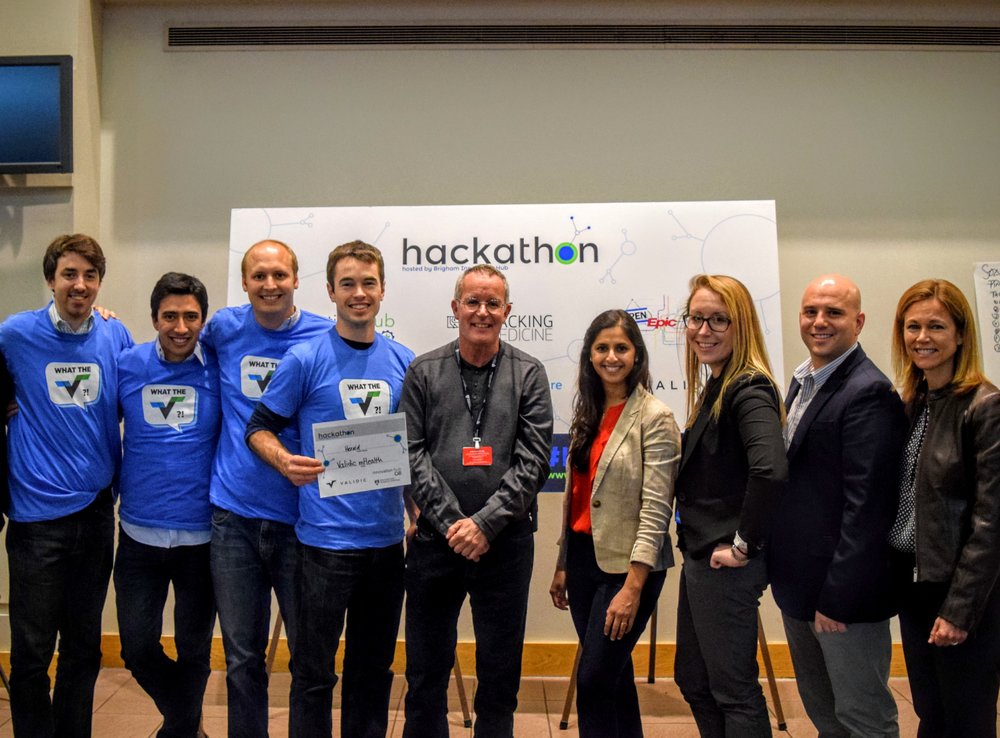
The best part of my job is meeting innovators and hearing their ideas. Over the next few months we’ll be telling you our favorite stories of innovators who’ve worked with Brigham and Women’s Hospital Innovation Hub (iHub).
It seems fitting to kick off this series with Herald Health – a team who created a product to bring efficiency to electronic health records (EHR) systems – because they’ve just announced the launch of a pilot program right here at BWH. The pilot, taking place over the next nine months, will help Herald refine and scale a platform designed to improve provider workflow within our complex EHR.
Getting to this stage in the innovation process is every digital health entrepreneur’s dream come true.
But let me start from the beginning. Two BWH residents, Brad Diephuis, MD, MBA, and Craig Monsen, MD, first came to iHub in November 2015 for the BWH Digital Health Hackathon where they coded a prototype version of their product over the hackathon weekend and delivered an award-winning pitch. Brad and Craig were joined by Matt Fujisawa, MBA, and Andrew Hillis – the four of them now make up the Herald Health founding team.
“Doctors are expected to monitor a great deal of data at all times, coming from various sources,” said Brad (now CEO), who worked as a computer scientist before becoming a physician.
On a recent overnight shift, Craig was responsible for 60 patients, one of whom was in heart failure but stable – let’s call him Mr. Brown. In the middle of the night, Craig received a stat page that Mr. Brown was experiencing a life-threatening heart arrhythmia; fortunately, staff stepped in and he recovered. Then Craig found a lab test showing low potassium levels for Mr. Brown. It wasn’t a critical value, so the lab didn’t call, but given that Mr. Brown was in heart failure, it was important. Brad and Craig then demonstrated the amount of time – and number of clicks on the computer – it would have taken to check a patient’s potassium level. For 60 patients, it would have taken forever.

Their solution was an alert system – in effect, their own personal, digital EHR assistant – doctors could customize, identifying specific information that they needed to be notified of, allowing them to act immediately on new labs and test results. Clinicians would create protocols based on three parts:
- Input (lab result, scan, test, or note)
- Condition (greater than X, less than X)
- Output (alert, text or email)
“It’s not just a neat trick – we think this will have a real impact on patient safety and the efficient use of hospital resources,” said Craig.
They won the top prize at the hackathon, and that was just the beginning. They went on to receive the grand prize from the Harvard Deans’ Health and Life Sciences Challenge and were among the winners of athenahealth’s More Disruption Please (MDP) Innovation Challenge hackathon. Most recently, they were named one of four winners of the U.S. Department of Health and Human Services Provider User Experience Challenge.

After months of research, surveying doctors, gathering feedback, and product development, Herald reached an agreement with BWH to launch a 9-month pilot. Today, they have an active beta version integrated into Epic, the BWH EHR system.
I recently talked with Adam Landman, chief information officer at BWH and mentor to Brad and Craig along their journey. He’s delighted to begin the Herald pilot: “It’s great to see something come out of the organized chaos of a hackathon and turn into an opportunity to improve patient care. That’s why we focused our last hackathon on using the open fast healthcare interoperability resources from Epic. There is enormous potential for innovators to extend and enhance electronic health records as Herald is doing.”
This month, the initial phase of the Herald pilot will begin in the BWH Internal Medicine department. A group of approximately 200 attendings and residents will use Herald and provide feedback for three months.
“Ultimately, we want to show that Herald makes an impact – that it helps physicians do their job and improves care,” said Brad.
My prediction: they will.
What are you innovating today?
Lesley Solomon
iHub Executive Director
